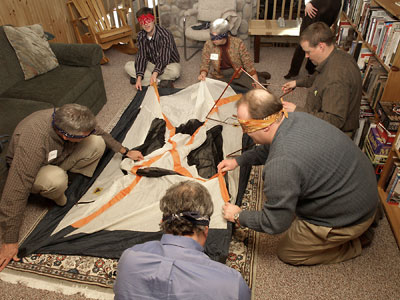Weeklong training helps CALS professors cope with others' tears and fears
By Lauren Chambliss

It is 11 a.m. on a Thursday, and 14 faculty members from the College of Agriculture and Life Sciences (CALS) have just been confronted with a sticky situation: what to do about a normally high-functioning staff member who is suddenly underperforming at the worst possible time, on the eve of a fictional department's big annual conference.
The scenario was actually part of a weeklong leadership training conducted this past summer. The group, including economists, plant breeders and engineers, divided into small groups to discuss different approaches. Then an associate professor sat down for a talk with the hapless "employee" -- an actress from the Cornell Interactive Theater Ensemble -- while colleagues observed and offered suggestions.
The simulated dialogue isn't as easy as it sounds, as the "employee" first denied she had a problem, but then she broke down about her personal life.
This is the stuff of nightmares for many academics, typically hired for their expertise in research, teaching, outreach and visionary thinking, not for their skill in navigating through interpersonal land mines that can trip up even the most adept organizational experts.
But whether it is mentoring students, becoming chair of a department, leading a large grant with multiple researchers or dealing with stakeholders and constituencies, faculty members are constantly confronted with organizational demands that require a level of personal interaction skills that often must be learned, says Pam Strausser, senior human resources consultant with Cornell's Office of Organizational Development and one of three program facilitators.
The leadership program, offered twice a year, is designed to enrich faculty members' understanding of their strengths and weaknesses as personal communicators, conflict managers, team builders and change leaders. Faculty members work in teams to assess individual leadership traits, develop personal plans for effective team building and explore personality differences to understand communication styles.
Participants say one of the benefits is engaging in free-flowing conversation and problem solving with peers from different departments, which break down the "silo" mentality and open their eyes to new opportunities and collaborations.
"I had no idea what to expect when I signed up for this," says plant pathology professor Alan Collmer. "I found it informative on so many levels. It adds another dimension to the way I think about situations and relate to people. It provided me with tools to ultimately help prevent or reduce interpersonal conflict, which, in an academic environment, can be very energy draining."
Collmer is one of more than 100 CALS faculty members who have taken advantage of the program, which requires a week out of hectic schedules.
Another leadership program at Cornell, "Effective Interactions in Organizations (EIO)," is a two-day training tailored for new chairs and others in positions of organizational authority. Like EIO, which is offered twice a year, the CALS leadership program is becoming increasingly popular as word spreads about its value. The last program in January filled up months before the start date.
"I continue to be impressed by how this program affects participants," says Michael Hoffmann, CALS associate dean and director of the Cornell Agricultural Experiment Station. "It is a rare respite from the intensity of academic life -- obtaining tenure, publishing, getting the next grant, responding to stakeholder needs. It is an opportunity to change the culture of an institution, from one that focuses on the individual to one that emphasizes collaboration and partnerships."
Lauren Chambliss is a communications specialist with the Cornell Agricultural Experiment Station in Ithaca.
Media Contact
Get Cornell news delivered right to your inbox.
Subscribe